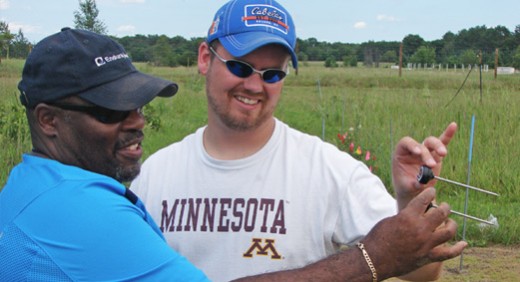Elementary and secondary teachers come to Cedar Creek Ecosystem Science Reserve to learn from the experts.

"Believe it or not, the listening experiment on our nature hike one of the highlights of their school trip," says field trip leader Mary Spivey, education coordinator for Cedar Creek Ecosystem Science Reserve. "The kids will actually ask to do it again!"
As the birthplace of ecosystem science, Cedar Creek's nine square miles are known throughout the world as the site of groundbreaking research on the most pressing environmental issues of our time. University of Minnesota professors David Tilman, Peter Reich and Stephen Polasky, superstars in the science of biodiversity and climate change, head up Cedar's Creek roster of cutting-edge researchers.
Now Cedar Creek's outreach team is using its facilities and peerless reputation to pursue a teacher training program to reach the next generation of ecologists. Jeffrey Corney, Cedar Creek's managing director, intends for the experimental reserve to become nationally recognized for its outreach efforts, specifically, its teacher training in the area of ecology.
Under Corney's direction, Cedar Creek is aggressively expanding its community involvement with on-site workshops for secondary-level school teachers. Spivey, a former chemistry teacher, is the principle contact for teachers and students. "For decades outreach has been a low priority, but it's now an intrinsic and strategic part of what we do because public education is an essential part of resolving global environmental issues," says Corney.
Cedar Creek offers multi-day intensive workshops for middle and high-school biology teachers during which teachers are drilled in ecology-related concepts. In return for their commitment, teachers get continuing education credit, a financial stipend and the comfort of knowing they can lead an ecology experiment from start to finish while fielding questions with authority.
The rigorous workshops—dubbed "boot camps" by some participants—stress investigative techniques that focus on the scientific method. This summer, five high school teachers got a dose of that intensity.
Chuck Levine, a teacher at Blaine High School, was comfortable with the theories of ecology but was intimidated by the processes behind them. He saw a flyer for Cedar Creek's teacher workshops about the same time he was starting to worry about how best to prepare for the wildlife biology class he has recently been assigned to teach.
"I'd never taught ecology before, but coming out of the workshops, I felt totally prepared." In fact, Levine was so confident in his new skills he led the class in a data-intensive earthworm study. His class ended up submitting their findings to the Great Lakes Worm Watch project, a regional science survey managed in part by the University's Natural Resources Research Institute.
Outreach requires a commitment to building relationships, which is why Spivey spends much of her time meeting with and coaching area teachers. The practice is paying off: Cedar Creek's school group attendance has tripled over the past two years and schools are returning year after year with busloads of new students.
At the end of every school visit, Spivey and her staff make a practice of waving goodbye to their visitors as their bus pulls away and heads off through the cornfields and paved roads of nearby housing developments. "Not many teachers have a prairie, a wetland and a forest outside their classroom door," said Spivey. "A trip to Cedar Creek is special, but we can also help teachers conduct engaging ecological experiences on their home turf, whether in a mud puddle or a parking lot."